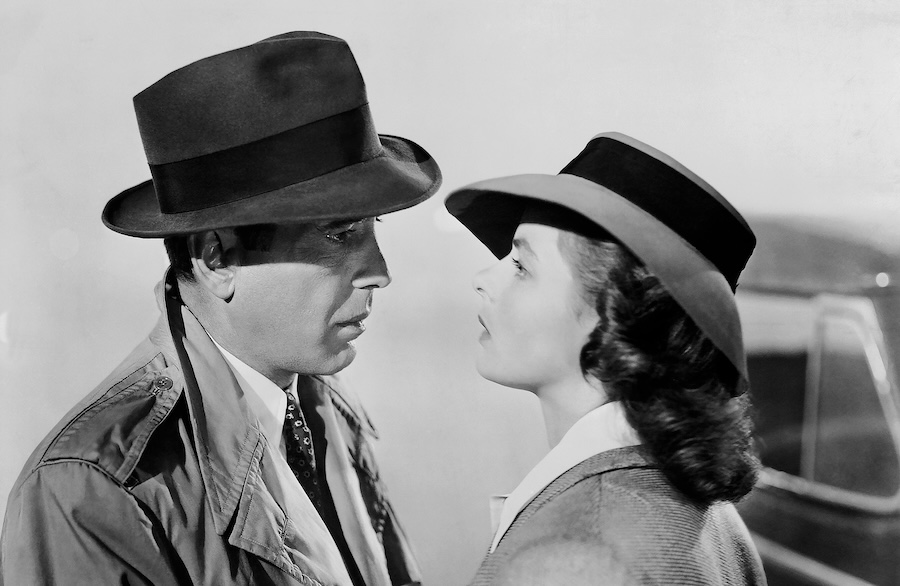
THEY HAD A DATE WITH FATE IN CASABLANCA!

Casablanca was just another movie meant to bolster the spirit of American audiences at a time when the nation had just entered an exceptionally bloody war against three nations. The director had plenty of experience, but he also had somewhat of an assembly-line approach to filmmaking and this wasn’t his only movie premiering that year. The two lead actors had not quite yet reached the top of stardom. But the film was nevertheless a hit and has become perhaps THE Hollywood classic over the years.
Fugitives from the Nazis gathering in Casablanca
The story takes place in the fabled Moroccan city, controlled by the Vichy regime, but also a place where fugitives from the Nazis gathered to find escape routes. Rick Blaine (Humphrey Bogart) runs a café known as a meeting place for such transactions; the owner has a neutral attitude and the local police captain, Louis Renault (Claude Rains), turns a blind eye as long as Rick lets him win at illegal gambling. Things are about to get more complicated, however.
A petty criminal (Peter Lorre) gives Rick letters of transit obtained after the murders of two German couriers. Shortly thereafter, Victor Laszlo (Paul Henreid), a Czech resistance leader on the run from the Nazis, arrives in Casablanca together with his wife, Ilsa Lund (Ingrid Bergman). They are looking for a way to flee to America, but the brutal German Major Strasser (Conrad Veidt) has also come to Casablanca and his main priority is to stop Laszlo. Rick is distraught to learn that Ilsa is in town; a few years ago, they had a passionate affair in Paris but he couldn’t handle the fact that she abandoned him. Now she’s back in his life and she wants the letters of transit.
Each minute matters
The film was put together by people at the top of their craft, even though they may not have realized the impact their work would have. Michael Curtiz has often been dismissed in discussions about Casablanca, particularly by proponents of the auteur theory, but his experience must have played a major role. Each minute of the running time matters and along with those other pros, the veteran screenwriters, Curtiz makes the story flow seamlessly.
Rarely has a film been this well cast.
Some may also think that this is a romantic story and not much else, but the theme of refusing to be neutral in the face of great injustice is powerfully conveyed, especially through the character of Rick who starts out as a cynic but ultimately decides to employ his considerable wits in the service of the Allied forces. One must remember that the film came at a time when it wasn’t clear which side would win the war; knowing that makes the unforgettable scene where the French patrons at Rick’s café outsing the Germans with “La Marseillaise” even more touching.
Rarely has a film been this well cast; Bogart and Bergman formed perhaps the most famous romantic couple in the history of cinema and Rains is perfect as the servile Vichy lackey who readily admits to following the wind wherever it blows. Sydney Greenstreet and Peter Lorre do characters they could play in their sleep, but they never make it look like that; Henreid is also quite effective as the courageous, principled leader of the resistance. Dooley Wilson sings “As Time Goes By” with a sentimental intensity.
One last thing: The dialogue. Hardly a line is uttered that won’t have you nodding in recognition. Witty, cynical and stirring, it is the ingredient you’re most likely to remember from every key sequence, starting with Lorre’s introduction (“Just because you despise me, you are the only one I trust”) and ending with the airfield scene (“I think this is the beginning of a beautiful friendship”).
Casablanca 1942-U.S. 102 min. B/W. Directed by Michael Curtiz. Screenplay: Julius J. Epstein, Philip G. Epstein, Howard Koch. Play: Murray Burnett, Joan Alison (“Everybody Comes to Rick’s”). Music: Max Steiner. Cast: Humphrey Bogart (Rick Blaine), Ingrid Bergman (Ilsa Lund), Paul Henreid (Victor Laszlo), Claude Rains, Conrad Veidt, Peter Lorre, Sydney Greenstreet, Dooley Wilson.
Trivia: When the film premiered, the original play had never been produced. Hedy Lamarr and Luise Rainer were considered for the part of Ilsa. William Wyler was considered for directing duties. Followed by two TV series, in 1955 and 1983.
Oscars: Best Picture, Director, Screenplay.
Quote: “Of all the gin joints in all the towns in all the world, she walks into mine.” (Bogart)
Last word: ‘‘Although people seemed to like me in Casablanca, I cared for myself less in that part than in the serious roles I have played. It was for this reason that I was so delighted when, after I saw Mr. Hemingway, he wanted me to play Maria in For Whom the Bell Tolls. […] But you must not forget that I come from Sweden and we Swedes are very different from Americans. By nature we are a more serious-minded people.” (Bergman, The New York Times)
